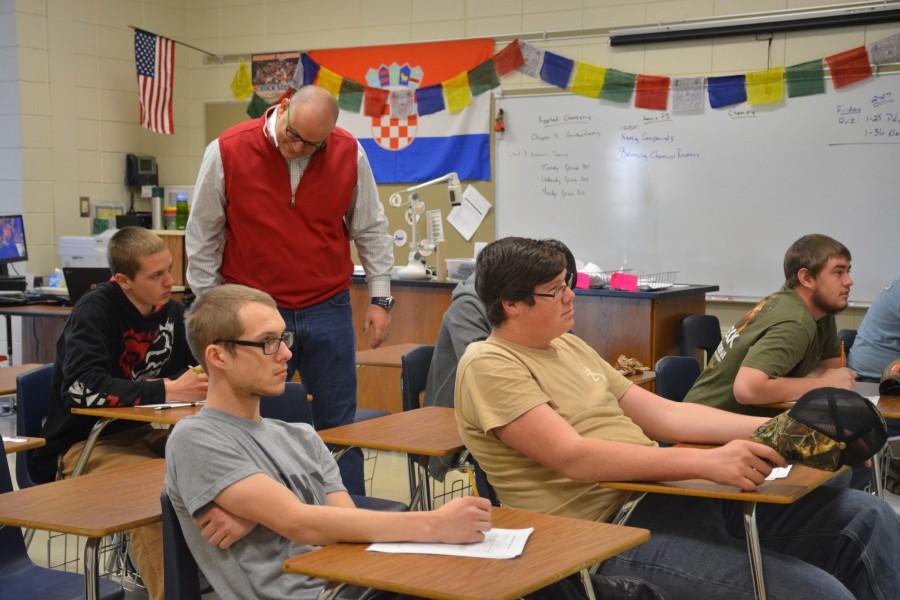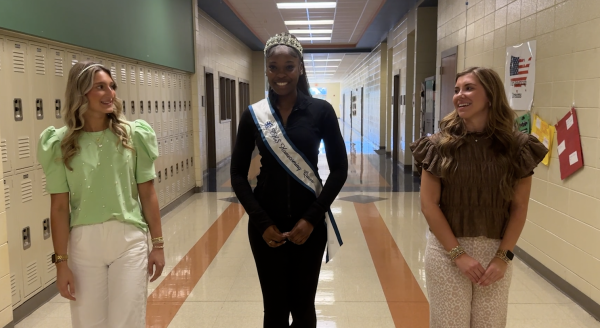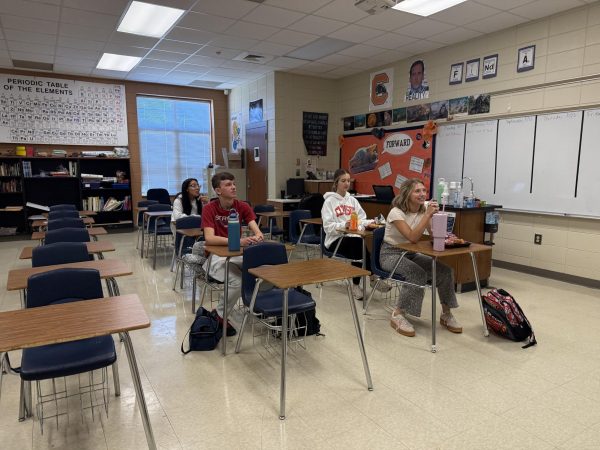The doctors are ready to teach you now
Science teacher Fred Brown explains content to his students. Brown completed his Ph.D. in 2014.
For several Chapman teachers, the pursuit of higher education hasn’t ended with a master’s degree.
Theatre teacher Carrie Roberts has Ph.D., which is a Doctor of Philosophy, in theatre.
The degree was a long process with multiple steps along the way including an involved, book-length work known as a doctoral dissertation, an analysis of one of Paula Vogel’s playwrights.
“It took me five years, but it’s different for everyone,” Roberts said. “I did two years of coursework and then comprehensive exams. There are five fields in theater with one exam for each, which are two questions with a total of two hours, so one hour per question. After that was a portfolio which includes an annotated bibliography, a 40-page essay and reviews. Then you form a committee for your dissertation which was a three year process. During that period, you send your adviser chapters at a time. Most people go through several different revisions. When your adviser feels it’s ready, it goes to your committee and defense. The last stage is to go into a room with your committee and they can ask you anything they want about your dissertation. After that, you get to walk across a stage and be called doctor.”
Roberts said that the amount of work can be scary.
“”It’s very scary because you have to know 3,000 years of history,” Roberts said.
Science teacher Fred Brown, who completed a Ph.D. in Educational Administration in 2014, said he had certain steps that he had to go through to complete the process, which included a five-chapter dissertation, which was titled “Leadership Perspectives on International Education for Public Students in South Carolina: Two Case Studies.”
“I had to complete specific courses, defend my comprehensive exams, write a proposal and defend it and then finish writing, which is chapters four and five, and then defend them,” Brown said.
Assistant Principal Andrew McMillan began his doctoral process began in January 2014 and defended his dissertation in February of this year; he will graduate in May of this year, 2016.
His doctorate is an Ed.D, a doctor of education, in Education and Administration.
In order to be admitted into the doctoral program at South Carolina State University, he had to have certain qualifications.
“First I had to apply for admissions,” McMillan said. “I had to have a certain amount of years experience and prerequisites, pay a small fee, complete writing samples and go through an interview process to get in.”
His dissertation title was “The Effectiveness of the Olweus Anti-bullying Program on Upstate South Carolina Elementary, Middle, and High Schools.”
The doctoral process in general is very difficult, but the hardest part is different for each person.
For Roberts, the hardest part was the revisions.
“(The hardest part was) when you got a chapter back and it looked like a red pen exploded on your page,” Roberts said. “When all of your hard work seems like it is never going to happen and you have to revise over and over.”
For Brown, the most difficult part was dealing with an adviser who was on an extended, professional leave.
“(The hardest part was) my professor was on sabbatical so instead of having it approved, I wrote it on my own and then got it approved after the fact,” Brown said.
For McMillan, the toughest part of the process was the time commitment.
“(The hardest part is) the time commitment for two years,” McMillian said. “You have something to do every single day like writing and just the little things as well. It was hard sitting at home on a Saturday knowing I had work to do.”
Although these teachers have sought high degrees and devoted themselves to academics, they did so while facing many of the same challenges their own students face.
“It was challenging to get a huge amount of work done in a short amount of time,” Roberts said. “It could be two to three books that had to be read in a week. You have to learn how to speed read or to skim.”
Brown experienced challenges at both the application and research portions of the process.
“I wasn’t approved for the program at first, so I had to reapply,” Brown said. “When I applied to do a study at one school district, they turned me down.”
McMillan said that it’s difficult to know what kind of help a doctoral student receive from his or her committee.
“In the process of trying to obtain your doctorate, you’re working with people who already have theirs,” McMillan said. “You can deal with people who had it hard when they were in the process, so they make it hard on you or people who will guide you through every step.”
Despite the difficulty of achieving the degree, these teachers say that the results are worth it.
“It better prepares you for for professional and national conferences,” Roberts said. “Also, it allows you to have a vaster language and knowledge so you are able to understand the context.”
“(Having a doctorate) opens many doors now that it is completed because people now know how serious I am about personal education, and with that, how I am in school,” Brown said.
“I was able to look at bullying and know that Olweus works and we can expand research,” McMillan said. “For me, I am now done going to school.”
Both Roberts and Brown acknowledged the financial benefit. Public school teachers with a doctorate make more money than public school teachers with any other degree.
Deciding to start the doctoral process is a huge step and decision to make.
“(I started the process) because at the time, I wanted to teach college theatre, and you have to have a terminal degree,” Roberts said.
“(I started because) after finishing my (educational specialist degree), there weren’t too many courses I had left to do in international study,” Brown said.
McMillan’s reason was personal.
“Personally, my grandfather passed away a year ago, and he never got above a 9th grade level,” McMillan said. “We always talked about education and he wanted to see my reach that. Doctorate is as high as you can go. My dissertation is dedicated to him.”
He had another group of people in mind, as well.
“Also, I did it for you guys, the students, so I can have my research up to date,” McMillan said.
Because these three have been through the ups and downs of the doctoral process, they have advice for those who are interested in taking part in this process one day.
“Find a creative and healthy outlet to reduce stress because it is going to be stressful,” Roberts said. “Find a good group of people as support.”
For Brown, persistence is key.
“It’s all about persistence,” Brown said. “You can’t give up.”
“Obtain your Doctorate while you’re young and stay in school,” McMillan said.
These words of advice are important teachers in the building who are pursuing their own doctoral degrees
English teacher Alex Hollis will receive an Ed.D. in Curriculum and Instruction with a concentration in Educational Technology.
He started the process because of an opportunity to obtain it online.
“The main thing that led me to it was that I got an email saying that a full doctorate process would be available online, and I was able to pursue it,” Hollis said.
He said that the hardest part of the process so far has been the amount of time that it takes to complete the work.
He has also faced challenges.
“The biggest thing is managing all of my other responsibilities while dedicating my time to coursework to do it properly,” Hollis said.
Hollis thinks the process is something he would recommend to someone willing to enter it with dedication.
“I think the process is very rewarding, and I’ve learned a lot,” Hollis said. “I recommend it but I don’t recommend entering the doctoral process lightly.”
Given that doctorates for public school teachers are less common than master’s degrees, students encounter few teachers that they should address as “Dr.” and that can be a different experience.
Junior Dillon Ramsey feels that calling a teacher that has received his/her doctorate is important because they’ve been through a lot to earn the title.
“I feel that knowing that a teacher has gone through the long and strenuous journey to receive the title of doctor brings a completely different aspect into the classroom,” Ramsey said. “It shows their strong work ethic and willingness to further education which are two great aspects a teacher can have. Though it is not required for a teacher to have a doctorate, it does say a lot about their character and it gives me a feeling that I will be taught to the fullest of their extent.”
Senior Mackenzie Stewart agrees.
“I think if a teacher goes by doctor, then they have a higher level of education and have spent more years learning so they are now able to teach with more knowledge in what they studied,” Stewart said.
Some students know what the process is because people have informed them and others know a few things but not much.
“From what I have been told, the doctorate process is extremely difficult in many ways,” Ramsey said. “The Doctorate comes after a Masters degree, which even itself, is hard to achieve. It requires a lot of work and schooling. If it was easy, everyone would have one.”
Ramsey has been informed by Dr. Brown.
“I have learned a lot about the doctorate route from my honors chemistry teacher, Dr. Brown,” Ramsey said. “After hearing many stories about the numerous colleges and classes he has had to attend, it really puts into perspective that this public school teacher really takes his work seriously and has better interest in mind.”
Your donation will support the student journalists of Chapman High School. Your contribution will allow us to purchase equipment and cover our annual website hosting costs.






